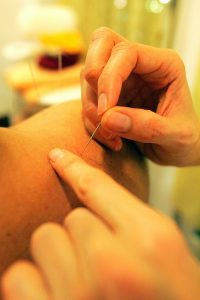What conditions are commonly treated by acupuncture?
Hundreds of clinical studies on the benefits of acupuncture show that it successfully treats conditions ranging from musculoskeletal problems (back pain, neck pain, and others) to nausea, migraine headache, anxiety, depression, insomnia, and infertility. Here are some examples:
Low-Back Pain
If standard treatments don’t relieve your chronic low-back pain, acupuncture may do the job, and two respected medical groups suggest that people in this situation give it a try. One large study found that both actual and “fake” acupuncture worked better than conventional treatments for back pain that had lasted more than three months. The jury’s still out on acupuncture for short-term (acute) pain in the low back.
Headaches
Acupuncture may help relieve migraines or tension headaches. Two large studies found that people receiving acupuncture had fewer days with tension headaches than those receiving conventional care.
Fibromyalgia
Studies that test how well acupuncture works against the pain of fibromyalgia have had mixed results. Some showed that it provided temporary pain relief, but others did not. A small study by the Mayo Clinic suggested that acupuncture may reduce two other problems of fibromyalgia: fatigue and anxiety. But overall, there’s not enough evidence yet to prove that acupuncture works for fibromyalgia.
Arthritis Pain
Acupuncture can be a helpful addition to conventional treatment for osteoarthritis, says the National Institute of Arthritis and Musculoskeletal and Skin Diseases. And some of the most promising, early research has shown acupuncture eased arthritis pain in the knee. However, more research is needed to prove without a doubt that it’s effective for osteoarthritis.
Carpal Tunnel Syndrome
Acupuncture was tested and compared with steroid pills for the hand and arm pain of carpal tunnel syndrome. Researchers in Taiwan gave one group eight acupuncture treatments, over about a month, and those patients reported more relief, for a longer time, than the group taking medicine. While studies like this have been promising, more evidence is still needed to confirm that acupuncture is effective for carpal tunnel syndrome.
Dental Pain
Acupuncture provides relief from the pain of tooth extraction or dental surgery. Dental pain is considered by many to be one of the conditions that responds to acupuncture.
Boost for Pain Medicine
Acupuncture may provide added pain relief when it’s used along with pain medicine or another therapy, such as massage. Acupuncture can reduce the need for drugs and improve the quality of life of people with chronic pain.
Nausea
Acupuncture at the pericardium (P6) acupuncture point on the wrist can reduce the symptoms of nausea and vomiting, even after cancer drug treatments or surgery. Studies compared 10 different acupuncture methods – including needles, electrical stimulation, and acupressure – to drugs that block nausea or vomiting and found the acupuncture treatments worked.
Acupuncture and Fertility
Celebrities such as singers Celine Dion and Mariah Carey credited acupuncture – used along with infertility treatments – with helping them get pregnant. A review of medical studies backs up this view, suggesting that acupuncture may boost the effectiveness of fertility treatments. One theory holds that acupuncture helps by reducing stress and increasing blood flow to the ovaries.
Acupuncture to Quit Smoking?
Acupuncture has been used for a variety of other conditions, including smoking cessation, insomnia, fatigue, depression, and allergies. The evidence is mixed at best for some uses of acupuncture.
Other Pain
People have tried acupuncture for neck pain, muscle pain, tennis elbow, and menstrual cramps, hoping to avoid medications and their side effects. The World Health Organization lists 28 different conditions that are sometimes treated with acupuncture (see https://www.sundari-center.com/acupuncture/).
When to Consider Acupuncture
Because acupuncture rarely causes more than mild side effects, it is a potential alternative to pain medications or steroid treatments. It is also considered a “complementary” medicine that can be used along with other treatments. It is best to discuss the use of acupuncture with your health care provider.
Who Shouldn’t Use Acupuncture
People with bleeding disorders or who take blood thinners may have increased risk of bleeding. Electrical stimulation of the needles can cause problems for people with pacemakers or other electrical devices. Pregnant women should talk with their health care provider before having acupuncture. It’s important not to skip conventional medical care or rely on acupuncture alone to treat diseases or severe pain.
(Adapted from http://www.medicinenet.com/acupuncture/article.htm)


Add CommentShow Comment Form